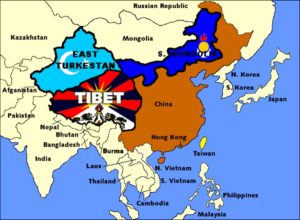 Reports have emerged from East Turkestan, renamed by China as Xinjiang, that tourists entering the at the Irkeshtam border between China and Kyrgyzstan are having their phones seized by Chinese border police. Surveillance apps are installed on the phone and then the data on the devices is searched against a long list of content that the authorities view as problematic.
Reports have emerged from East Turkestan, renamed by China as Xinjiang, that tourists entering the at the Irkeshtam border between China and Kyrgyzstan are having their phones seized by Chinese border police. Surveillance apps are installed on the phone and then the data on the devices is searched against a long list of content that the authorities view as problematic.
Content relating to Islamic extremism, including Inspire, the English medium magazine produced by Al Queda; weapons manufacturing; Ramadan fasting; literature authored by His Holiness the Dalai Lama and even music by a Japanese metal band called Unholy Grave is extracted from the devices and stored in a rapidly expanding database which, for the city of Kashgar alone, is believed to currently store 68 billion records. For comparison, the United States FBI’s national database in the US held 19 million records at the end of 2018.
One traveller reported to The Guardian that he had handed his phone and provided his pin number to security officials before waiting for an hour at the border to have his device returned. In most cases it appears that the surveillance app is removed before authorities return the phones to the travellers, but some have been disconcerted to find the app still on their phone after having it returned.
These practices, described as “draconian” and “unlawful” by Edin Omanovic, chair of the campaign group Privacy International, are part of a broader campaign across East Turkestan to police the ethnic Uighur Muslim majority and, according the Chinese Communist Party leadership, “preserve stability”.
Up to one million Uighurs, Hui and other Muslim minorities are currently thought to be detained in concentration camps throughout the province. Inmates are detained as a direct result of state-wide surveillance which targets Muslims and has become increasingly pervasive since riots in the regional capital, Urumqi, broke out in 2009.
Some outside observers believe that China’s policies in East Turkestan show the frightening power of the 21st century police state. The Chinese government, however, defends its use of surveillance, saying it has improved security in the region.
Visiting police officers from other Chinese states have praised the policies in Xinjiang. Zhang Ping, a counter-terrorism officer from Jiujiang in southeastern China said Xinjiang’s high-tech policing was “something we should vigorously study”.
East Turkestan, or Xinjiang, is an autonomous territory in northwest China, a vast region of deserts and mountains with abundant oil and mineral reserves and is home to many ethnic minority groups, including the Turkic Uyghur people. The ancient Silk Road trade route linking China and the Middle East passed through East Turkestan.




 Print
Print Email
Email